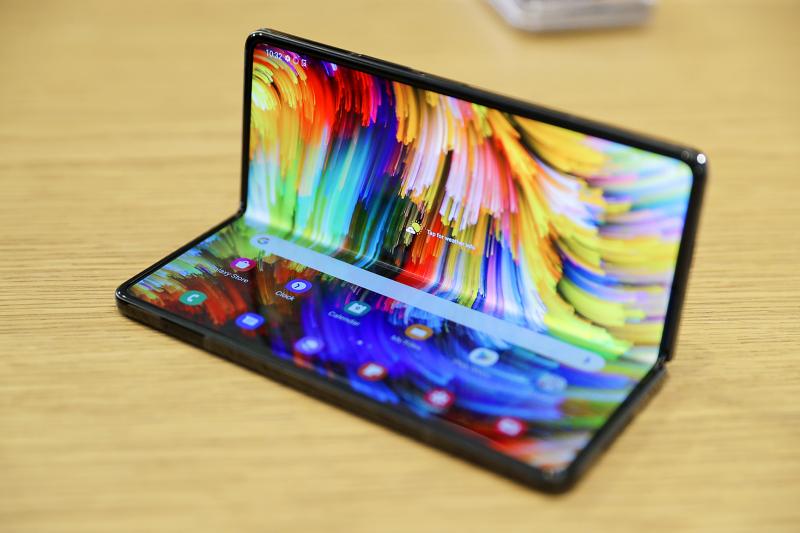Samsung Electronics Co’s operating profit rose more than 25 percent thanks to rising prices for semiconductors and surprisingly strong demand for its pricey foldable smartphones.
South Korea’s largest company reported operating profit of 15.8 trillion won (US$13.2 billion) in the three months ended last month, in line with the 15.75 trillion won average of analyst estimates. Sales were 73 trillion won, compared with estimates of 73.5 trillion, according to preliminary results released yesterday.
The world’s largest maker of memory chips and smartphones has benefited from strong demand as the global economy recovers from the COVID-19 pandemic. Chronic shortages have pushed up prices of memory chips, used in everything from mobile phones to smart cars, and the data centers powering cloud computing and services. Samsung is also expanding its foundry business, churning out custom chips for customers like Nvidia Corp.

Photo: AP
In the mobile business, Samsung is ramping up production to meet strong demand for its foldable phones. The Z series, launched in August, can cost more than US$1,800 but also includes the first sub-US$1,000 foldable in the Galaxy Z Flip 3, which has expanded the category’s customer base.
Samsung sold one million new foldable phones at home in Korea at the third-fastest sales pace after its Note 10 and Galaxy S8, the company said.
While Samsung is better known outside of South Korea for its smartphones, its profits are largely driven by its memory-chip business. Semiconductors account for the largest slice of its income.
Memory chip prices are expected to fall in the current quarter because of stockpiling by customers, signaling a potential cyclical downturn. Micron Technology Inc, one of Samsung’s primary rivals, gave a conservative outlook because PC demand is slowing.
“DRAM operating profit could climb due to sequential bit growth of 3-5 percent and also price rises in 3Q. NAND may also drive strong profit growth in 3Q due to a 10-15 percent sequential rise in bit shipments with a price increase of 5-9 percent. The chip shortage may help operating profit for the foundry business climb in 3Q. New foldable smartphones may fuel sales growth in the mobile division,” Bloomberg Intelligence said.
“While we expect DRAM market weakness in 4Q in 2021 and 1Q in 2022 on weak PC demand and relatively high inventory level at clients, we believe memory makers are more likely to accumulate inventory and revise down their 2022 capex to support memory pricing, rather than maximizing production,” Citigroup analyst Peter Lee said. “In any case, we expect the DRAM market to recover in 2022 due to supply constraint, given limited available clean room space and the launch of DDR5 products.”
Samsung’s foundry business has benefited from the transition to 5G wireless technology and high-performance computing, which have increased the global need for more sophisticated chips.
Robust sales of the Z foldable phones are likely to continue into the first quarter, and Chinese smartphone brands are increasing their purchases of foldable displays from Samsung, said Greg Roh, a senior vice president at HMC Securities.

To many, Tatu City on the outskirts of Nairobi looks like a success. The first city entirely built by a private company to be operational in east Africa, with about 25,000 people living and working there, it accounts for about two-thirds of all foreign investment in Kenya. Its low-tax status has attracted more than 100 businesses including Heineken, coffee brand Dormans, and the biggest call-center and cold-chain transport firms in the region. However, to some local politicians, Tatu City has looked more like a target for extortion. A parade of governors have demanded land worth millions of dollars in exchange

Hong Kong authorities ramped up sales of the local dollar as the greenback’s slide threatened the foreign-exchange peg. The Hong Kong Monetary Authority (HKMA) sold a record HK$60.5 billion (US$7.8 billion) of the city’s currency, according to an alert sent on its Bloomberg page yesterday in Asia, after it tested the upper end of its trading band. That added to the HK$56.1 billion of sales versus the greenback since Friday. The rapid intervention signals efforts from the city’s authorities to limit the local currency’s moves within its HK$7.75 to HK$7.85 per US dollar trading band. Heavy sales of the local dollar by

Taiwan Semiconductor Manufacturing Co’s (TSMC, 台積電) revenue jumped 48 percent last month, underscoring how electronics firms scrambled to acquire essential components before global tariffs took effect. The main chipmaker for Apple Inc and Nvidia Corp reported monthly sales of NT$349.6 billion (US$11.6 billion). That compares with the average analysts’ estimate for a 38 percent rise in second-quarter revenue. US President Donald Trump’s trade war is prompting economists to retool GDP forecasts worldwide, casting doubt over the outlook for everything from iPhone demand to computing and datacenter construction. However, TSMC — a barometer for global tech spending given its central role in the

An Indonesian animated movie is smashing regional box office records and could be set for wider success as it prepares to open beyond the Southeast Asian archipelago’s silver screens. Jumbo — a film based on the adventures of main character, Don, a large orphaned Indonesian boy facing bullying at school — last month became the highest-grossing Southeast Asian animated film, raking in more than US$8 million. Released at the end of March to coincide with the Eid holidays after the Islamic fasting month of Ramadan, the movie has hit 8 million ticket sales, the third-highest in Indonesian cinema history, Film